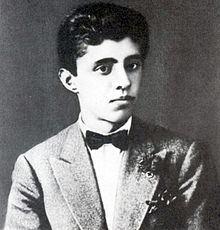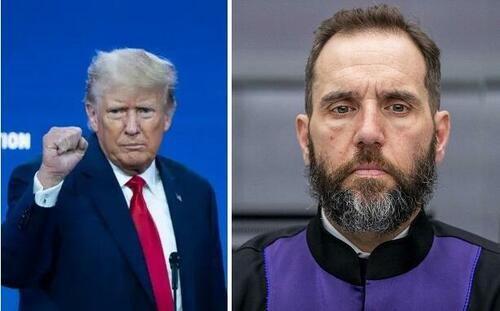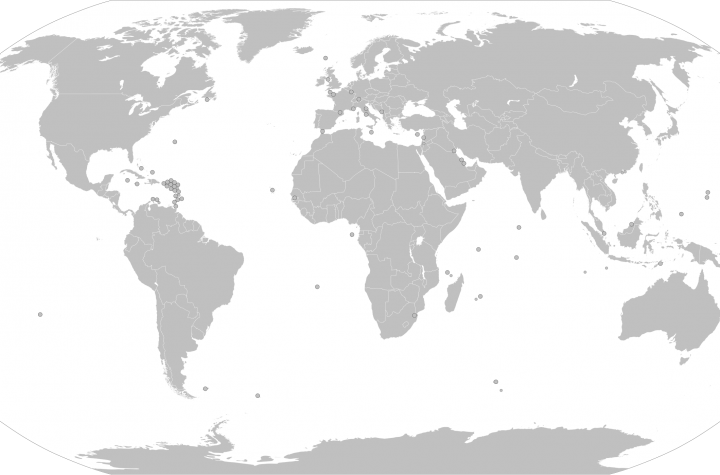
Enver Hoxha
| Enver Hoxha | |
|---|---|
 |
|
| First Secretary of the Albanian Party of Labour | |
| In office 8 November 1941 – 11 April 1985 |
|
| Succeeded by | Ramiz Alia |
| Personal details | |
| Born | 16 October 1908 Ergiri (today Gjirokastër),Vilayet of Janina, Ottoman Empire |
| Died | 11 April 1985 (aged 76) (diabetes, stroke) Tirana, People’s Socialist Republic of Albania |
| Nationality | Albanian |
| Political party | Party of Labour of Albania |
| Spouse(s) | Nexhmije Hoxha |
| Children | Ilir Hoxha Sokol Hoxha Pranvera Kolaneci |
| Religion | None (Atheism) prev. |
Enver Hoxha (![]() pronunciation (help·info); 16 October 1908 – 11 April 1985) was the leader of Albania from the end of World War II until his death in 1985, as the First Secretary of the Party of Labour of Albania. He also served as Prime Minister of Albania from 1944 to 1954, Minister of Defence, Minister of Foreign Affairs, Chairman of the Democratic Front from 1945 to his death, and as Commander-in-Chief of the Albanian armed forces from 1944 to his death. Hoxha’s leadership was characterized by his proclaimed firm adherence toanti-revisionist Marxism–Leninism from the mid-1970s onwards. After his break with Maoism in the 1976–1978 period, numerous Maoist parties declared themselves Hoxhaist. The International Conference of Marxist–Leninist Parties and Organizations (Unity & Struggle) is the most well known collection of these parties today.
pronunciation (help·info); 16 October 1908 – 11 April 1985) was the leader of Albania from the end of World War II until his death in 1985, as the First Secretary of the Party of Labour of Albania. He also served as Prime Minister of Albania from 1944 to 1954, Minister of Defence, Minister of Foreign Affairs, Chairman of the Democratic Front from 1945 to his death, and as Commander-in-Chief of the Albanian armed forces from 1944 to his death. Hoxha’s leadership was characterized by his proclaimed firm adherence toanti-revisionist Marxism–Leninism from the mid-1970s onwards. After his break with Maoism in the 1976–1978 period, numerous Maoist parties declared themselves Hoxhaist. The International Conference of Marxist–Leninist Parties and Organizations (Unity & Struggle) is the most well known collection of these parties today.
Contents[hide] |
[edit]Biography

The house where Hoxha grew up in Gjirokastër
Hoxha was born in Gjirokastër, a city in southern Albania (then under the Ottoman Empire) that has been home to many prominent families. He was the son of Halil Hoxha, a Bektashi[1] Tosk cloth merchant who travelled widely across Europe and the United States of America, and Gjylihan (Gjylo) Hoxha. At age 16 he helped found and became secretary of the Students Society of Gjirokastër, which protested against themonarchist government. After the Society was closed down by the government, he left his hometown and moved to Korçë, continuing his studies in a French secondary school. There he learned French history, literature and philosophy. In this city he read for the first time the Communist Manifesto.[2]
In 1930, Hoxha went to study at the University of Montpellier in France on a state scholarship given to him by the Queen Mother for the faculty of natural sciences. He attended the lessons and the conferences of the Association of Workers organised by the French Communist Party, but he soon dropped out because he wanted to pursue a degree in either philosophy or law. After a year, not having much interest in biology, he left Montepelier to go to Paris hoping to continue his university studies. He took courses in philosophy at the Sorbonne, and he collaborated with L’Humanité, writing articles on the situation in Albania under the pseudonym Lulo Malësori. He also got involved in the Albanian Communist Group under the tutelage ofLlazar Fundo who also taught him law.[3] He soon dropped out once more, and from 1934 to 1936 he was a secretary at the Albanian consulate in Brussels, attached to the personnel office of Queen Mother Sadijé. He was dismissed after the consul discovered that his employee had deposited Marxist materials and books in his office. He returned to Albania in 1936 and became a grammar school teacher in Korçë. As a result of his extensive education, Hoxha was fluent in French and had a working knowledge of Italian, Serbian, English and Russian. As a leader, he would often reference Le Monde and the International Herald Tribune.[4]
On April 7, 1939, Albania was invaded by fascist Italy.[5] The Italians established a puppet government in Albania under Mustafa Merlika-Kruja.[6] Hoxha was dismissed from his teaching post following the 1939 Italian invasion for refusing to join the Albanian Fascist Party.[7]He opened a tobacco shop in Tirana called Flora where a small communist group soon started gathering. Eventually the governmentclosed it down.[8]
[edit]Partisan life
On 8 November 1941, the Communist Party of Albania (later renamed the Albanian Party of Labour in 1948) was founded. Hoxha was chosen from the “Korca group” as a Muslim representative by the two Yugoslav envoys as one of the seven members of the provisional Central Committee. From April 8 through April 11, 1942, the First Consultative Meeting of Activists of the Communist Party of Albania was held in Tirana.[9] Enver Hoxha delivered the main report to the assembled delegates on April 8, 1942.[10] In July 1942, a “Call to the Albanian Peasantry” was written by Enver Hoxha and issued in the name of the Communist Party of Albania.[11] The call was issued to enlist support in Albania for the war against the Italian fascist invaders. The peasants were encouraged to hold back their grain, refuse to pay any taxes and/or any livestock levy brought against them by the Albanian fascist government.[12] After the September 1942 Conference at Pezë, theNational Liberation Front was founded with the purpose of uniting the anti-Fascist Albanians, regardless of ideology or class.
By March 1943, the first National Conference of the Communist Party elected Hoxha formally as First Secretary. During the war, the Soviet Union‘s role was negligible, making Albania the only nation occupied during World War II whose independence was not determined by a great power.[13] On 10 July 1943, the Albanian partisan groups were organised in regular units of companies, battalions and brigades and named the Albanian National Liberation Army. The organization received military support from the British intelligence service, SOE.[14] The General Headquarters was created with Spiro Moisiu as the commander and Enver Hoxha as political commissary. Communist partisans inYugoslavia had a much more practical role, helping to plan attacks and exchanging supplies, but communication between them and the Albanians was limited and letters would often arrive late, sometimes well after a plan had been agreed upon by the National Liberation Army without consultation from the Yugoslav partisans.
Within Albania itself there were difficulties in communications between groups of partisans fighting the fascist invaders. Throughout the war, repeated attempts were made to improve communications between the many partisan groups operating within Albania. In August 1943, a secret meeting was held in the town of Mukje between the anti-communist Balli Kombëtar (National Front) and the Communist Party of Albania. The result of this was an agreement to:
1. Unite in a single struggle against the fascist invader.
2. Cease all attacks between the two parties signing the agreement.
3. Form a joint operational staff to coordinate military actions within Albania.
4. Recognize that the democratically elected national liberations councils are the state power in Albania.
5. Recognize that the goal for the post-war era is an independent, democratic Albania where the people themselves will decide the form of government.
6. Recognize and respect the Atlantic Charter, the London and Washington Treaties between the USSR, Great Britain and the United States in connection with the question of Kosovo and Camëria. Be it resolved that the populations of Kosovo and Camëria will themselves decide their future in accordance with their wishes.
7. Unite with any political group, whatever their beliefs, in a common military effort against the fascist invaders.
8. However, the Communist Party of Albania will not collaborate with any group of the National Front that continues to maintain contacts with the fascist invaders.
9. The Communist Party of Albania will unite with any group that used to have contacts with the fascist invaders, but has now terminated those contacts and is willing to now fight against the fascist invaders, provided those groups have not committed any crimes against the people.[15]
In order to encourage the Balli Kombëtar to sign, the Greater Albania sections of this Agreement which included Kosovo (part of Yugoslavia) and Çamëria (part of Greece) were made part of the Agreement.[16]
A problem developed however when the Yugoslav Communists disagreed with the goal of a Greater Albania and asked the Communists in Albania to withdraw their agreement. According to Hoxha, Josip Broz Tito had agreed that “Kosovo was Albanian” but that Serbian opposition made transfer an unwise option.[17] After the Albanian Communists repudiated the Greater Albania agreement, the Balli Kombëtar condemned the Communists, who in turn accused the Balli Kombëtar of siding with the Italians. The Balli Kombëtar, however, lacked support from the people. After judging the communists as an immediate threat to the country, the Balli Kombëtar sided with the Germans, fatally damaging its image among those fighting the Fascists. The Communists quickly added to their ranks many of those disillusioned with the Balli Kombëtar and took center stage in the fight for liberation.[18]
The Permet National Congress held during that time called for a “new democratic Albania for the people.” King Zog was prohibited from visiting Albania ever again, which further increased the Communists’ control. The Anti-Fascist Committee for National Liberation was founded, with Hoxha as its chairman. On 22 October, the Committee became the Democratic Government of Albania after a meeting in Berat and Hoxha was chosen as interim Prime Minister. Tribunals were set up to try alleged war criminals who were designated “enemies of the people“[19] and were presided over by Koçi Xoxe.
After liberation from the fascist occupation on 29 November 1944, several Albanian partisan divisions crossed the border into German-occupied Yugoslavia, where they fought alongside Tito’s partisans and the Soviet Red Army in a joint campaign which succeeded in driving out the last pockets of German resistance. Marshal Tito, during a Yugoslavian conference in later years, thanked Hoxha for the assistance that the Albanian partisans had given during the War for National Liberation (Lufta Nacionalçlirimtare). The Democratic Front succeeded the National Liberation Front in August 1945 and the first elections in post-war Albania were held on 2 December. The Front was the only legal political organisation allowed to stand in the elections, and the government reported that 93% of Albanians voted for it.[20]
On 11 January 1946, Zog was officially deposed and the People’s Socialist Republic of Albania was officially established. As First Secretary, Hoxha was the head of state.[21]
Albanians celebrate their independence day on 28 November (which is the date on which they declared their independence from the Ottoman Empire in 1912), while in the former People’s Socialist Republic of Albania the National Liberation festivity date was 29 November. Both days are currently national holidays.
read the full article here http://en.wikipedia.org/wiki/Enver_Hoxha






More Stories
Why Greeks Want The Bailouts To Stop
Banks – Have Governments Forgotten Their Purpose?
Lagarde List – Does Greece Have The Dumbest Media & Politicians In Euro Zone?